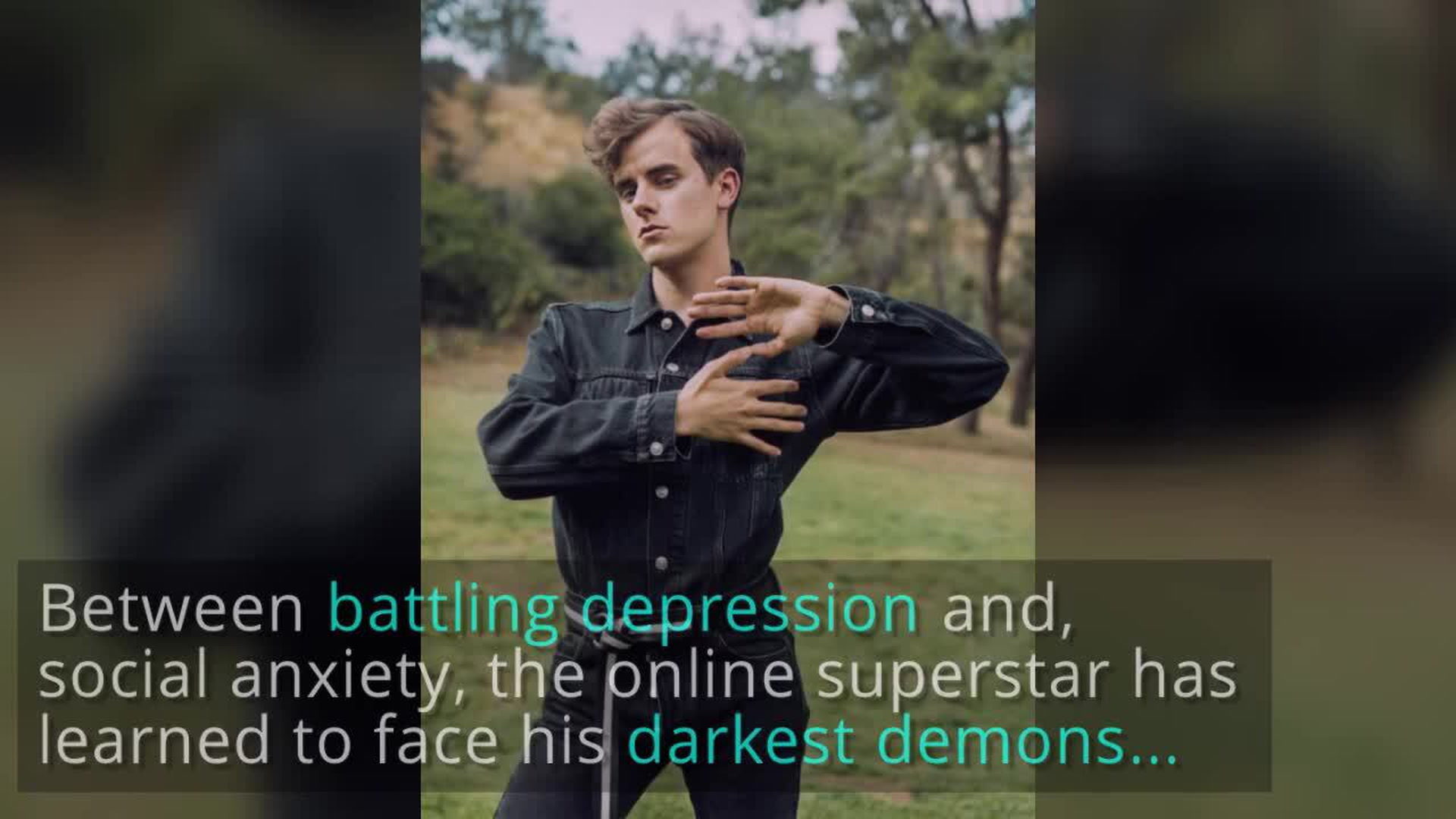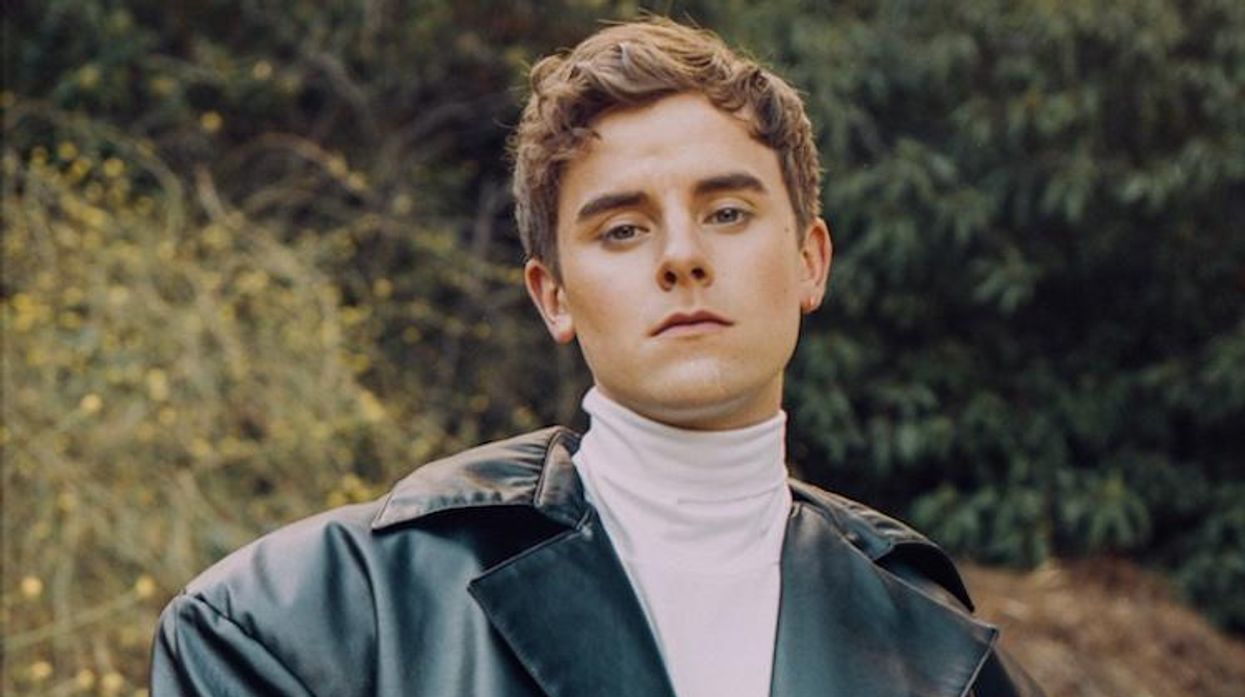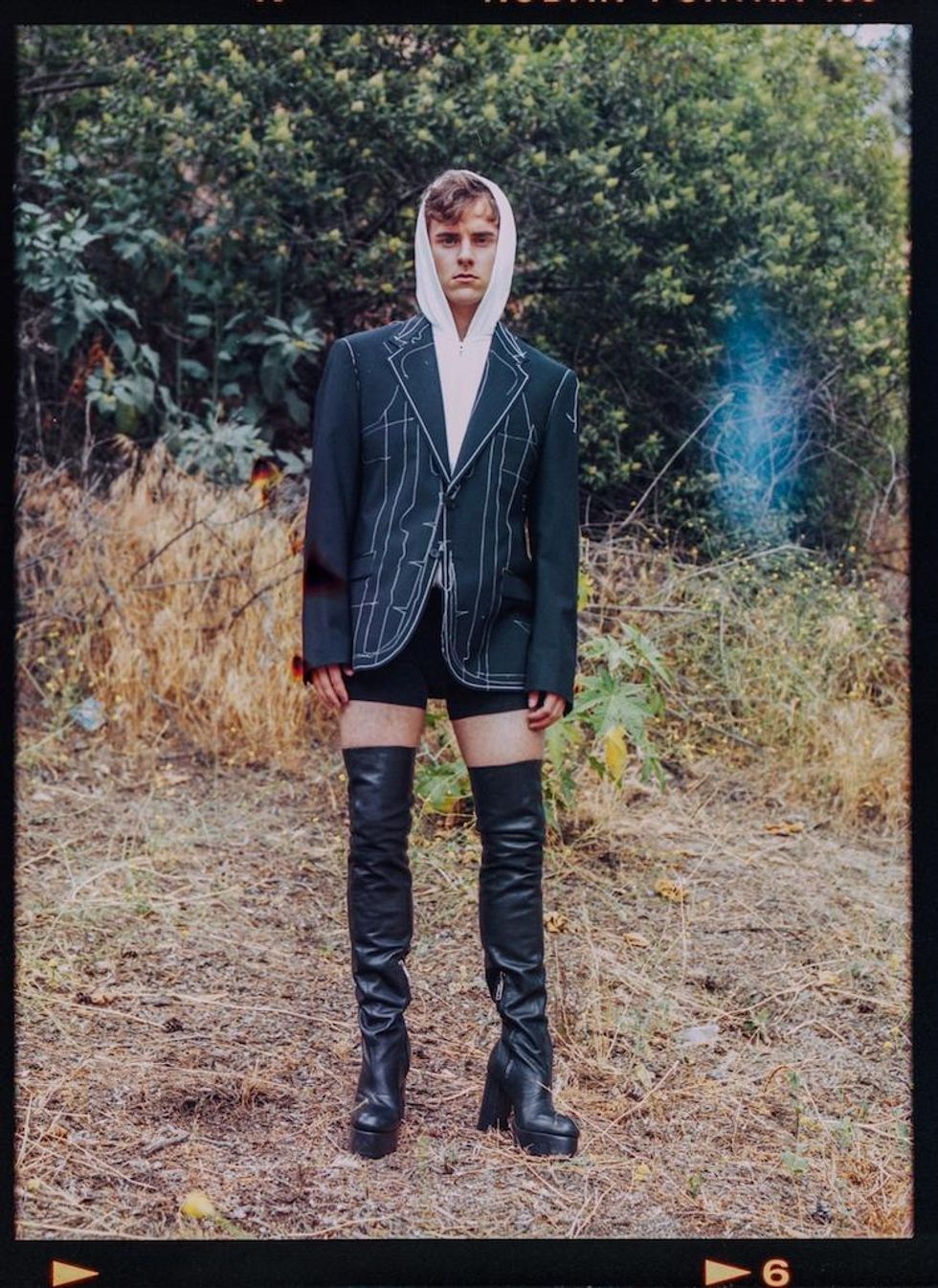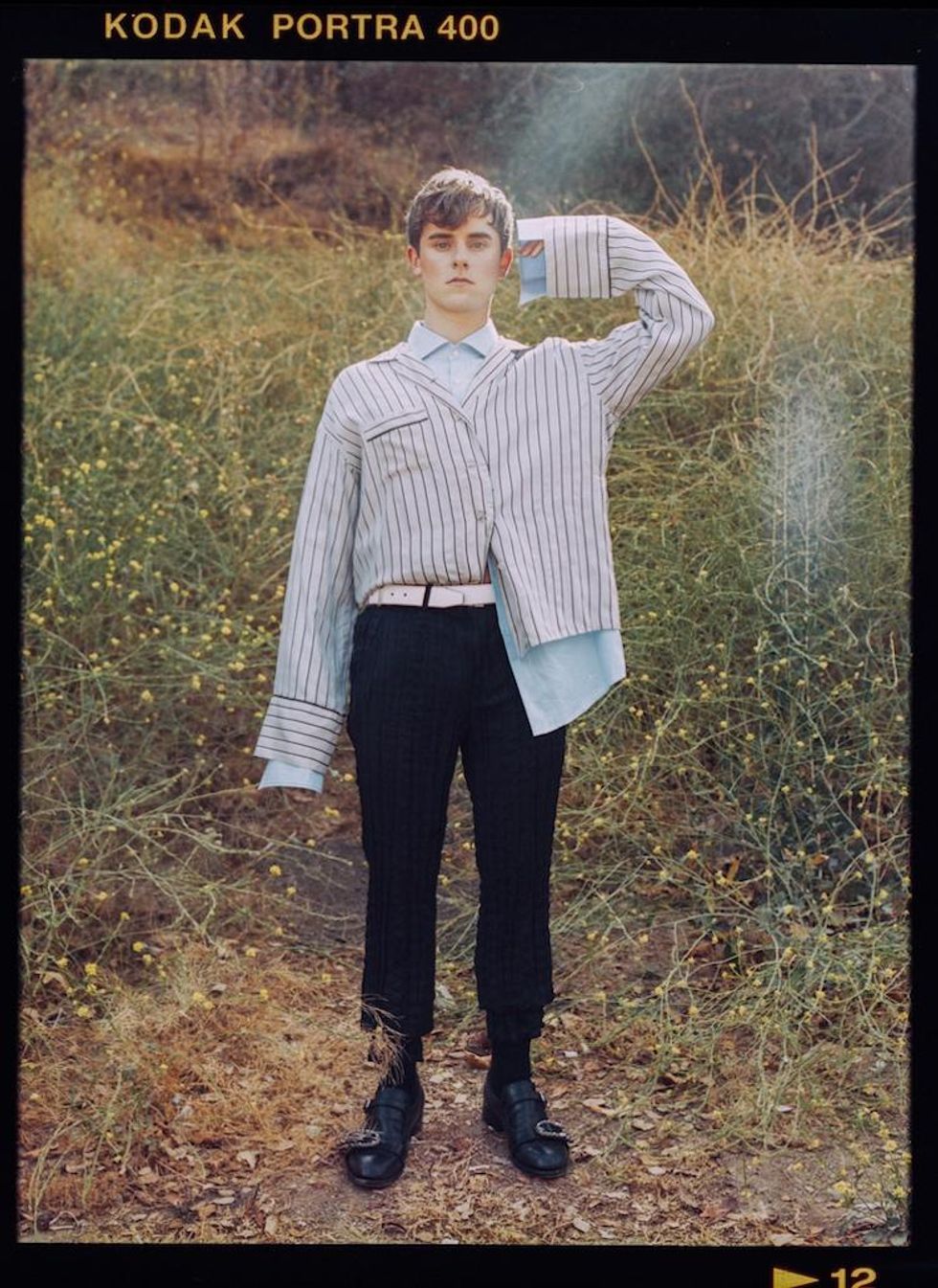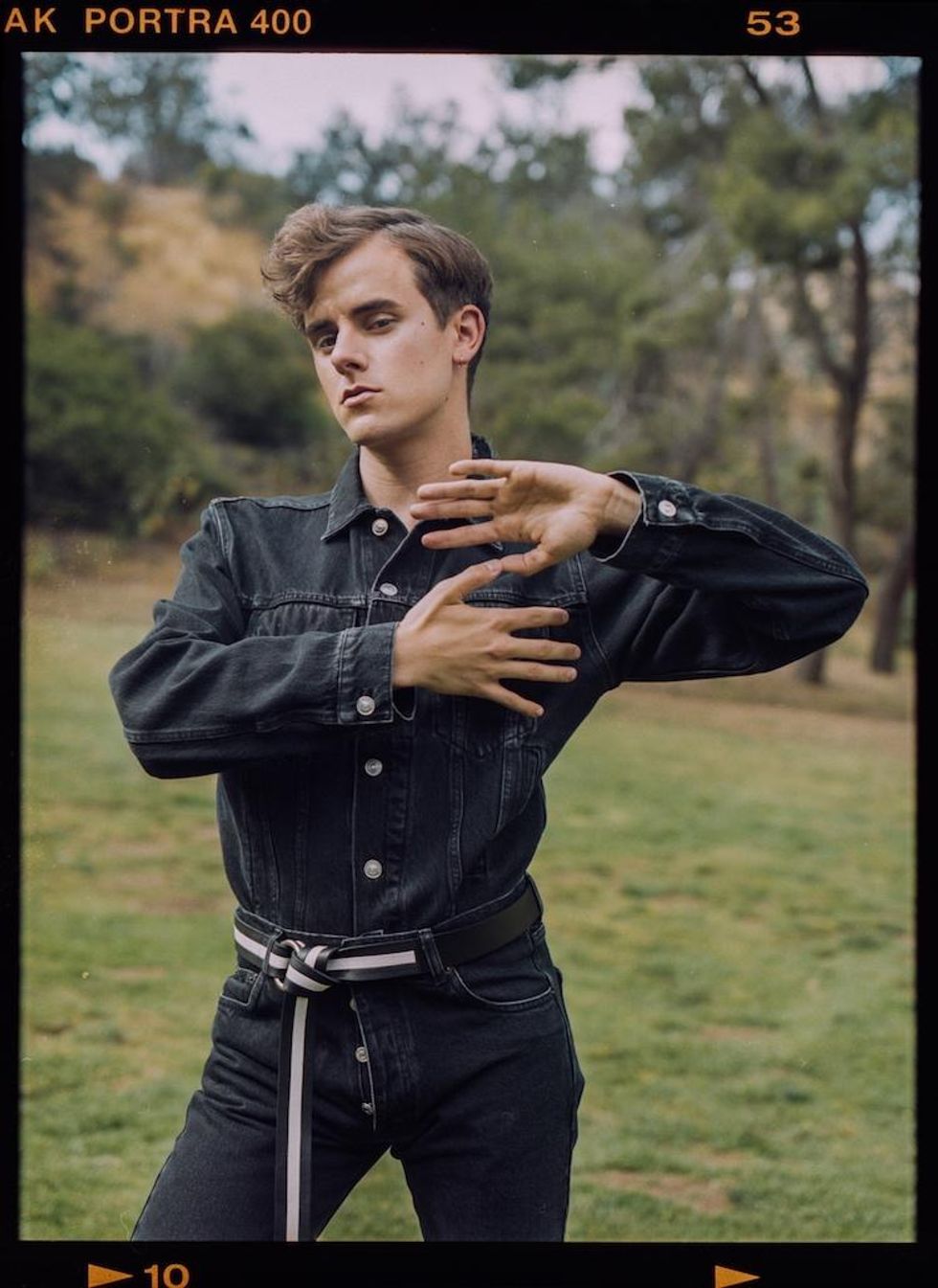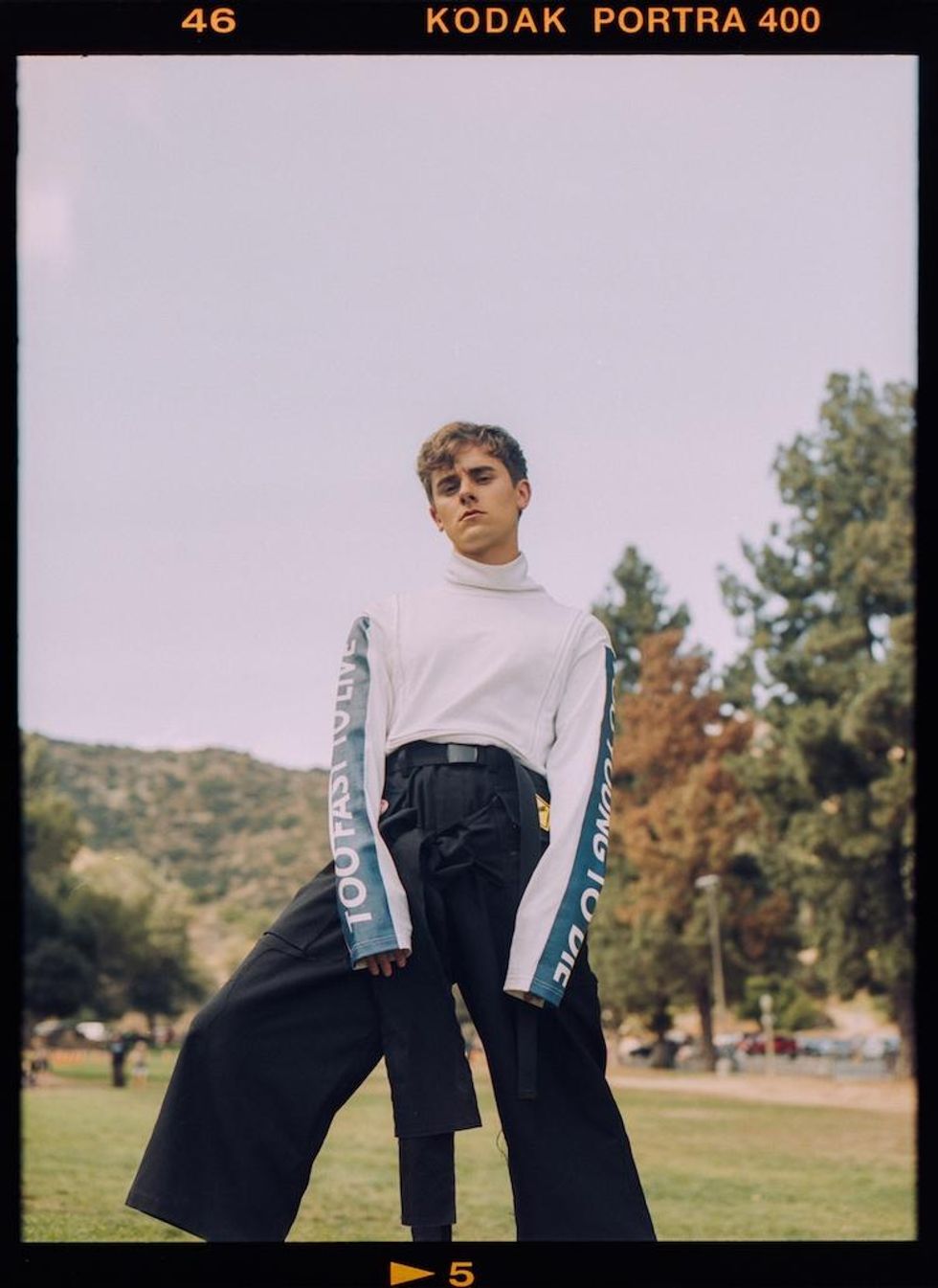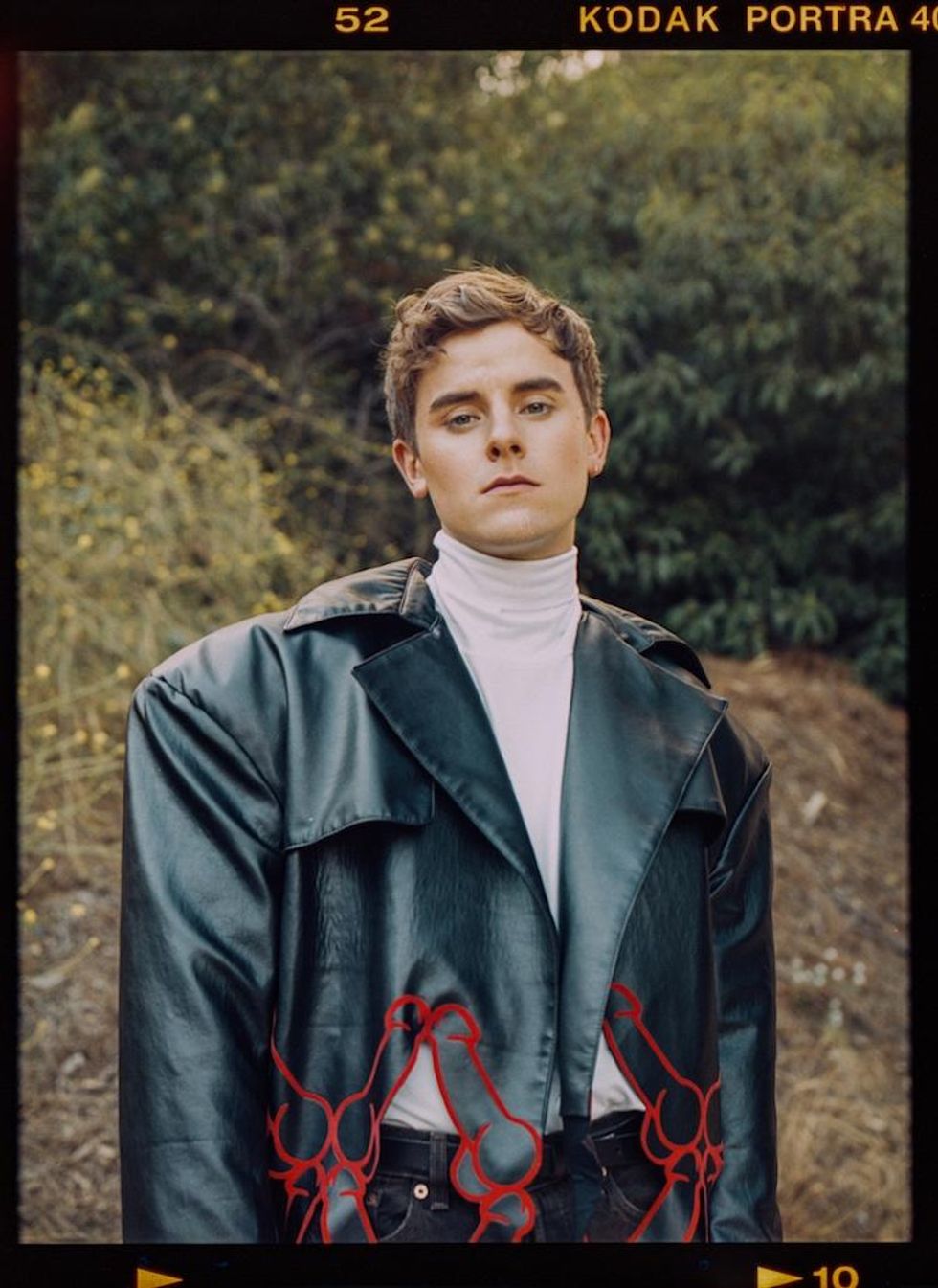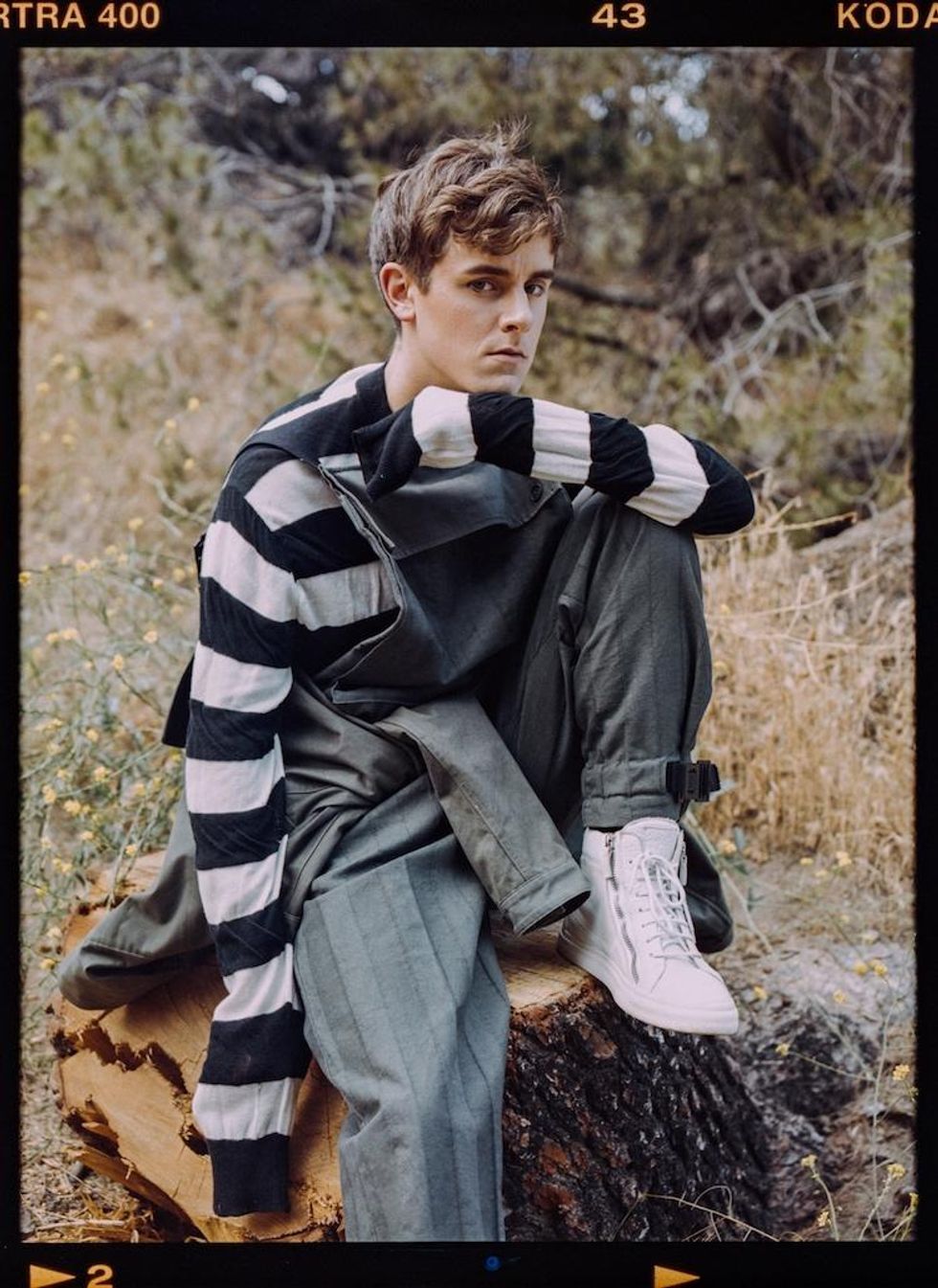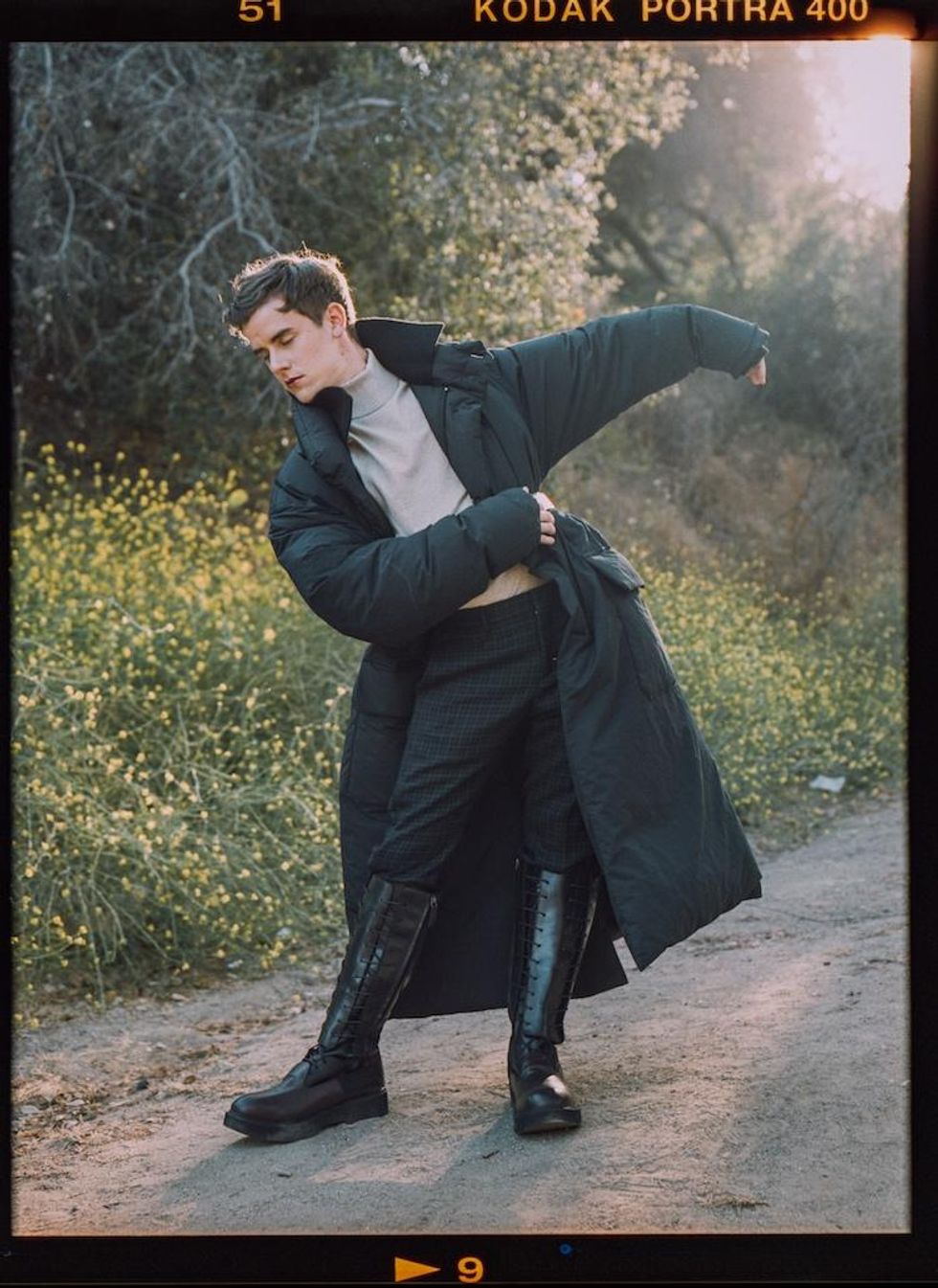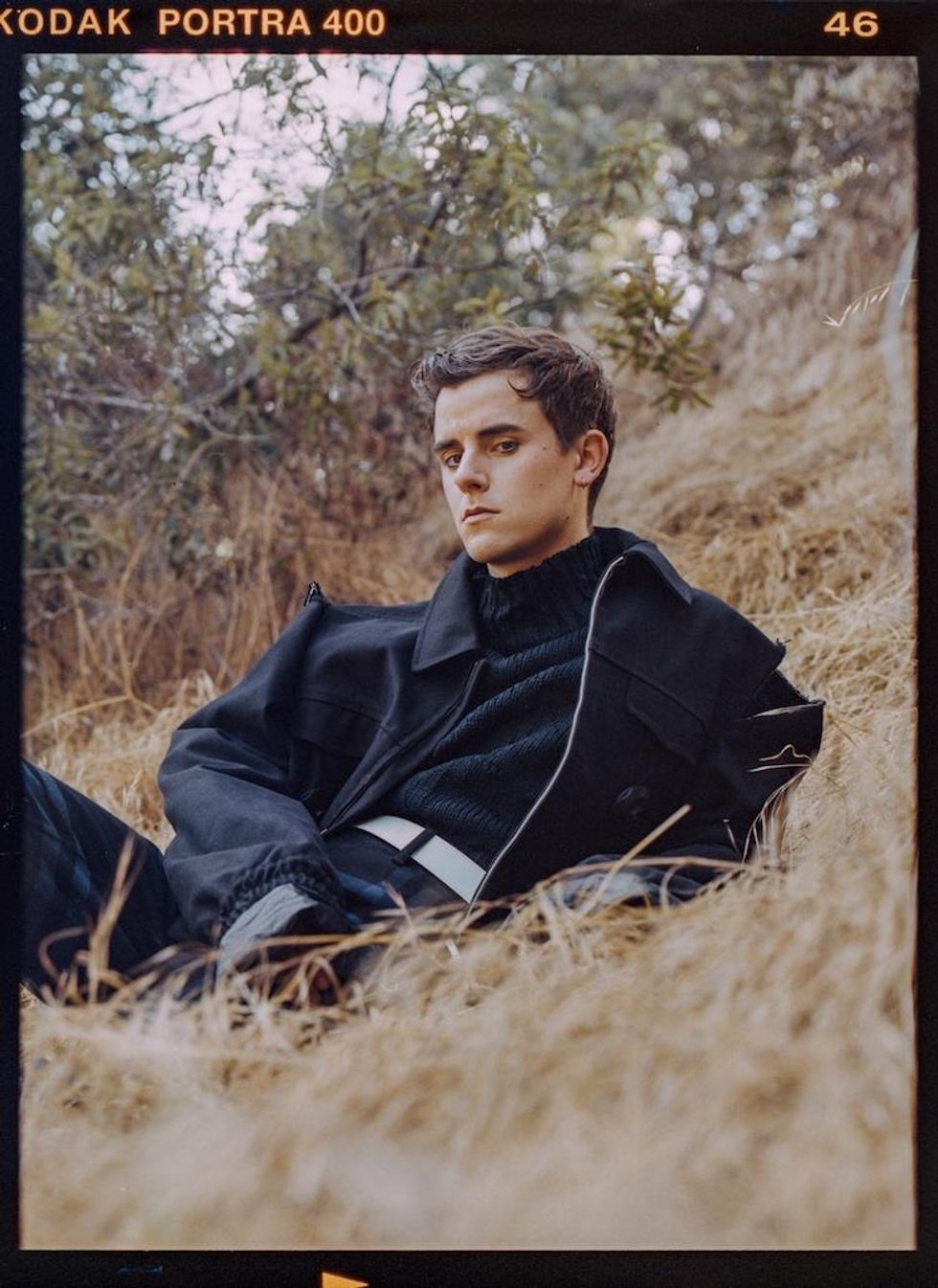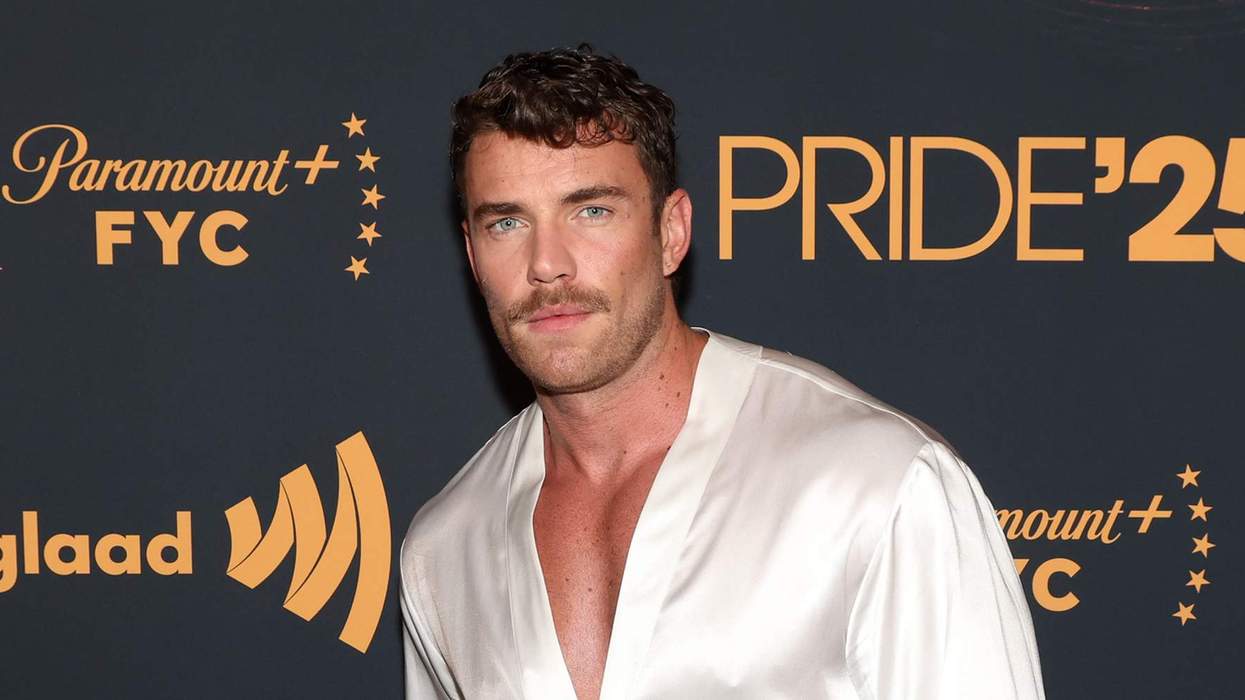When Connor Franta came out on YouTube in 2014, the 24-year-old helped pioneer a new form of queer leadership in the digital age. His personal life story--one of slow burning self-acceptance after years of repressing his sexuality--has been viewed online more than 11 million times, pushing Franta to the forefront of contemporary LGBTQ culture and educating a new generation about what it means to embrace your true identity.
Like with most, if not all, LGBTQ people, learning to be comfortable in your own skin is something Franta's struggled with long before his pivotal coming out video and continues to wrestle with daily. Between battling depression and, at times, social anxiety, the online superstar has learned to face his darkest demons--both privately and openly--in order to be an example for the millions of people following him on social media.
Related | Gallery: Connor Franta
By shedding his layers and baring all his insecurities, Franta's message is relatable for a community that's historically been pushed to the fringes and told they're abnormal. Whether he's candidly speaking to his 5.6 million YouTube followers as is they're his best friends or penning intimate journal entries in one of his two New York Times best-selling books--A Work in Progress or Note to Self--Franta has fostered an international community united by otherness.
We recently sat down with Franta to discuss his second book, Note to Self, and all the self-inflicted hurdles he's had to jump in order to become the confident, proudly gay activist he is today--though he admits those hurdles are still inevitable and endless.
OUT: You've released your second book, Note to Self, this spring and recently wrapped a book tour. How long did it take to finalize everything before publishing?
Connor Franta: It was about 16 months or so. It's called Note To Self because it was literally notes to myself initially. I just found myself going through an interesting rollercoaster part of my life and I was writing in my notes on my phone, and writing small essays to get thoughts out of my head. After about six months of collecting almost half of the book unintentionally, I brought it to my publisher, who I had publish my last book, and was like, 'I think I have a second book idea if you're open to it being very out there' It's just a collection of notes, photos and poetry along the way.
How has the experience of expressing yourself this way been different than through YouTube?
It's been a lot more cathartic and takes a lot more time and depth of thought. When you sit down and allow yourself to fully dive into your own brain, it's interesting what will come out of it. A lot of the other stuff [I do] is kind of goofy, spur of the moment, whatever comes to mind quick. This is much slower and you let it kind of simmer for a while. It's definitely night and day compared to everything else I put out into the world. So much more time goes into it. Rarely do I ever work on anything for more than like a month, let alone a year and a half.
Jacket: Maison Margiela, Sweater: ATM Anthony Thomas Melillo, Shorts: Calvin Klein, Boots: Christian Dada
How have you changed since you first began writing?
Looking back on it now, it's really interesting to see the point I was at a year ago--to see how much of a slump it was and to see how much a year can do for you. Half the time, that's what everyone's advice to me was no matter what negative thing I was going through: 'It just takes time,' and that's the fucking worst answer you can give someone because you can't speed up time. You can't do anything besides wait. It's interesting, though, to see at the end of the day that [they're] right, time does heal all... or most. Still a subtle sting (Laughs).
Did you anticipate these notes being something other people would read?
No, and that's the funny part. A lot of it still to this day stresses me out that it's in the book and I wonder why I put it into the book. But at the end of the day the book is hopefully going to find some sort of universal truth other than people relating directly to my story. Hopefully they can relate to the broad experience of the book, and hopefully it will do more good than bad--maybe a little bad to myself, [but] good to the world.
What are some of those things that make you cringe, knowing people will read them?
The book dives into things like mental health, a lot into like dating, and then a lot into my coming out experience. It's all those encompassed in a book, allowing it to dive deeper, and [to] show both the light and the dark side of all that is very exposing. I feel very vulnerable. This is like my life written down.
Blue Shirt: Hugo Boss, Grey Shirt: Christian Dada, Pants: Issey Miyake, Belt: Bally
Where do you find that balance between private and public life, or is that balance not important to you?
It's interesting. With everyone, no matter [if] you're a social influencer, a YouTuber, a movie star, or just an average person with a normal day-to-day [life], I feel like you have to find that balance in today's world. For me, I've always drawn the line. I usually keep relationships in all and any forms to myself. Because I figure those are things that I can hold sacred to me and that I don't need other people to be involved in. So typically, I keep the details of my family life, my friendships and my relationships on the DL just because I want something for myself. Everything else is so public.
But then you reflect on love and relationships a lot in Note to Self.
I do, and I definitely dive deeper than I have before, but it's also kind of a broad take on the experience of dating, breaking up and falling in love and out of love. It's more the full experience of it, not necessarily nitty gritty details.
Related | Note to Self: Read Three Exclusive Excerpts from Connor Franta's Intimate New Book
There's a very specific attitude towards love in the book. When you think about your experience with love as a whole, how has that been?
I kind of missed love growing up. I feel like it's always something I wanted and something I strived to get, but could never obtain because obviously I was always running away from whoever I really loved. So to be able to experience it a little bit later in life, but so quickly after coming out [at 21] is interesting. It was kind of a whirl wind in a way--like a dog chasing its tail after it finally catches it. It's kind of like, 'Oh my God, what do I do now?'
It's true, you entered gay love in a much different way than most people do--very publicly online through a viral YouTube video.
Definitely. It's weird too because traditionally people would go on dates or join dating apps, but there's always this weird feeling [for me] about doing that. I only joined my first dating app within the last six months because I've always just felt weird about it. But my coming out video's probably singlehandedly the best thing I've ever done with my career, and may be the best thing I ever do with my career because of its large impact and lasting impact. I still have people come up to me to this day and say it helped them a lot, which is so humbling.
Jacket & Jeans: Balenciaga, Belt: Michael Kors, Boots: Marcelo Burlon
While YouTube feels normal today, the site was only created in 2005, so your coming out in this way is truthfully a cultural phenomenon--something that's never happened in LGBTQ history.
That's the whole reason I came out... because of YouTubers. When I was sitting alone in my bedroom wanting to be myself, I would search videos very secretly, and watch those and think other people are doing what I want to do. They're being open and gay, they're creating things, they're moving to different cities. Any different type of thing I wanted, I could see someone else doing in a way that seemed obtainable. In a way, YouTube made it [feel] like anything was possible in my life because other people were doing it that were just like me.
You grew up in Minnesota, where parts of the state are more tolerant of LGBTQ people than others. How was your experience?
It was good. I had a really quiet childhood, I mean like I raised animals, I brought stuff to the fair. I was very Minnesotan. I went to a high school that had 400 people, I went to a middle school that had like 70 total people in all the grades, so it was just a quiet normal average life. It was great to be honest. I really enjoyed my childhood.
What kept you quiet about your sexuality for so long?
The lack of representation in my real life. What eventually helped fill that void was finding representation online and finding the LGBTQ community on the Internet. I didn't know any gay people in real life. The closest thing to a gay person I knew was Ellen Degeneres. She was on my TV every single day. That really set me back personally because I had no one to help me--no one to look up to or no one to frankly tell me I was normal. There's something about YouTube... You can see anyone and anyone can post anything. It all felt so real, I felt like people were beaming into my room and talking directly to me. YouTube was a weird, comforting phenomenon I hadn't seen or felt before.
Now, with millions of followers at your fingertips, is it weird to look back on such a quiet upbringing?
Every time I go home, everything gets smaller and quieter, and I don't realize it until I'm in a city like New York and then I go [back] and it's absolutely dead. It's interesting to see the different lifestyles people have. But people-wise, I love going back because everyone in Minnesota is genuinely nice to everybody. I get so many weird looks for holding doors open for people in LA. They just look at me strange. I appreciate the duality and I feel like I have two lives.
Turtleneck: Christian Dada, Pants: Sankuanz, Belt: Kuhl
Everyone I know from Minnesota leads a fairly normal, private life. Have those values carried into your life today?
I think so, yeah. I definitely have a lot of the same morals and values that were instilled in me growing up that have trickled with me along the way. My family was always so kind and accepting of other people, and I feel like that really helped shape me into the person I am and helped my coming out experience, too. My family's been fucking great. They've been so amazing in every aspect of my life--so accepting, warm and loving with everything that comes with coming out. I don't think I'd be the person I am without every single one of my family members.
How do you you make your followers feel like they know and understand you, but then still be private?
It's a think I've learned to do over time. It didn't come naturally at all. A lot of the stuff I do now-a-days did not come naturally to me. I was always naturally a reserved person, naturally creative, but again reserved. My creativity was always creating in silence, and to think that now I do the complete opposite of that--my job is to in front of large groups of people my job is to be confident, my job is to be authentic and creative to the world--is just strange. It's the opposite of what I thought I would be doing, or what I was doing five years ago.
What did you think you'd be doing?
I did really really well in high school. I had a 3.9 or a 4.0, but I also did not know what I wanted to do. So when I went to college for two years, I just did what half the people do and picked kind of a bullshit major. I picked business, but it was also mind-numbingly easy for me. So then I added art to the mix and that became my stability, but also what drove me. I would stay up working on some sculpture for an art class, not because it mattered, [but] because I thoroughly enjoyed it. there's a chapter in the book, called 'Full Circle,' because that's what my job consists of now. It's doing business and creating art in many forms, but at the time, I went to [St. John's University] in Minnesota, and Target is based in Minnesota, so I had in my mind that I was going to work for Target. I had a vision that my destiny was cubicles, working in the back of some room doing a nine-to-five, and I can't imagine that now.
Coat: Namilia, Turtleneck: Zachary Prell
You really created a viable career that didn't exist.
Totally, and it took so much convincing to convince people that it was a career. I moved out to Los Angeles just for fun with a friend for the summer, and I'd already had a pretty big YouTube following at the time, like a couple hundred thousand. I had enough saved up, so that I could have a summer just working on my YouTube channel, but I convinced my parents after a couple months that I should take a semester off of school--drop out-and pursue that because within the three months of the summer, I had doubled my following. I was like, 'It's really growing and I feel like it could be something, I don't know what [that] something is, but you just have to trust me.' After a month of them making every call possible to my University and being like, Pull some strings, like let him live off campus so he can do both,' the campus didn't budge. They had no choice but to let me live.
In Note to Self, you tackle many personal subjects, one of which is your experience with depression. Have you always struggled with that?
There's such a taboo and so many stigmas attached to depression. I never wanted to admit that I had it or that I had any sort of mental health-related issue. It was always a thing I ignored, kind of like my sexuality--a thing that was there, but I was always going to push it back and hide it from the rest of the world, and go through silently and struggle. But it wasn't until last year that it came out of nowhere and really showed its ugly face. I was already going to therapy because I think every person, whether you have a problem or not, you should go to therapy--it's very freeing. After a while of talking through [my depression], I finally realized I needed to go get evaluated and realized there was nothing wrong with that. I couldn't keep avoiding it and pretending like it doesn't exist. Pretending doesn't help, it just makes it louder and get worse.
This was the second emergence of your depression?
I probably had several depressive episodes in high school that I can't remember, but the one I can thoroughly remember was my freshman year of college. I was so out of it, I think because I was in a new environment. I didn't know what I wanted to do with my future, I still was trying to date girls, but I didn't enjoy it. It was just that whole, 'I'm going to be alone forever and that's just how it is.' In hindsight, I'm like that was 100 percent a depressive period. It was a thing that followed me like a shadow for months on end.
Sweater: Comme des Garcons, Jacket & Pants: Marcelo Burlon, Sneakers: Giuseppe Zanotti
What triggered this second round?
I went through a really bad breakup, but also going through that made me spiral into who am I as a gay individual. What I want to do as an individual? It was this quarter life crisis of who am I truly without other people attached, without my job, without anything. Who am I? I used to be so uncomfortable with being by myself, but now I'm so fine. I forced myself to go to London by myself, I've gone on trips by myself with the intention of being by myself and be comfortable going out to dinner by myself just to see what it's like. I've never been consciously aware that that was a hard thing before.
How intense did your depression get during this time?
It got really bad. I would go through episodes and I'd spend days upon end not leaving my bed--sometimes not even eating. It was almost like I was physically crippled. I couldn't move at times. I just didn't want to move. You lose a will to do anything.
How has your experience been struggling with social anxiety?
I guess when you don't know how to function as just yourself--if you don't have a partner in crime or someone that can be the other half of your brain--it's just weird to find people to fill all those voids. Like when you're at a party, you normally always have that one person, so what do you do when that one person isn't there? You don't have that person to go back to, [so] you're just wandering. I mean, you can easily find that in friends, but I wanted to figure out how to find that in myself. I've been to so many parties just this year in comparison to last year that I'm just like, 'I feel so comfortable sitting on this couch by myself or going to talk to that random person because I like their shoes by myself.' If you make an effort just to remind yourself how to do that, it's not that difficult. It takes practice, but I definitely had a lot of social anxiety realizing that I'm in the business of social and I don't know how to be social. It was strange, and I don't want to be that weird Internet kid who you meet in person and I don't know how to communicate. I was like, 'I want to be a normal human, who can communicate in person and online.'
When you're by yourself, do you feel a sense of comfort knowing you have millions of people to talk to online?
Yes and no. At the end of the day social currency [is] cool, but it's kind of like money in the sense that it doesn't buy you happiness to have followers. It can make certain things in your life easier, but by no means does it make your life perfect.
Turtleneck: Todd Snyder, Coat: Issey Miyake, Pants: Coach 1941, Belt: Salvatore Ferragamo, Boots: Marcelo Burlon
Self love is certainly more important than social currency.
I don't think anyone loves themselves 100 percent and I think if they say they do, they're lying. But I think that's okay. I would actually hate to love every aspect of myself because then there would be nowhere to improve. I definitely think I love parts of myself that I never knew I would love, even like the weird quirks or the weird social anxieties--I guess where it forces me to be somewhat of a hermit and somewhat alone I really enjoy now. I know that it's okay to enjoy that. I definitely don't fully love myself, but I think that's still fine.
Self love takes time.
It's definitely an ongoing exploration for everybody--and through all your evolutions, kind of loving whatever you are in that day and time. I think self love has [to] come through self acceptance, but also through confidence. A year ago, I would have been nervous to wear anything other than traditional male clothing or ordinary simple clothing. But as soon as you rip that bandaid off and try one of those things, whether it's putting on lipstick or speaking in front of a crowd of 100 people, you realize it's not so bad. It took experiencing those things to realize that I really enjoy them and to love every facet of me.
Was self love easier for you after coming out?
I think I've had two journeys accepting myself: Before I came out and after I came out. Maybe after a year I came out, I realized I had a whole new journey to begin. I knew who I was before, but then accepting this relatively big detail about myself opened up a whole new world for me. It was an interesting battle becoming comfortable with myself. Where do you begin? There's no class--nobody to tell you how to love yourself. It's something you learn over time, and over time I've learned that I'm independent. I can be self-sufficient. I'm overall stronger than I'd like to give myself credit for.
Turtleneck: Issey Miyake, Jacket: Sankuanz, Pants: G-Star, Belt: Bally
Do you think of yourself as an activist?
I feel like I've become more vocal just in this last year than I have ever before. I'm less afraid to share my opinions on topics. I'm less afraid to speak up versus sitting in silence and accepting the standards put before you. I have this huge platform with younger people that are itching to learn anything from me or know what I think about any topic. When we're in a political climate like [today's], it's more important than ever to be a voice to the world--to be a voice for the future generation. I take a lot of pride and responsibility in that.
What message do you want your followers will take away from you?
I hope people take away that they matter in every way. Just because they're one person and they might not have a large social media following or an important job or are of a certain age level, that doesn't mean their voice doesn't matter. In fact, it's collectives of people that really make true change and a collective is not a collective without each and every individual who's a part of it. I want people to feel like they're important.
Photography: Vince Aung
Styling: Star Burleigh
Grooming: Christopher Miles
